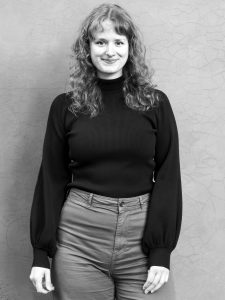Nicola Groß

Shortbio
- Since 12/2023 Registration for the Doctoral Program at Friedrich-Schiller-Universität Jena, Professorship in Cultural History
- Since 2022 Fellow at DFG Research Training Group 2227 “Identity and Heritage”, Bauhaus-Universität Weimar
- 2020 Study abroad at Aarhus Universitet, Denmark
- 2018–2022, master’s degree in art history at Rheinische Friedrich-Wilhelms-Universität Bonn. Thesis topic: “Utimut. The Danish National Museum’s handling of colonial collection items using the example of the Greenland Repatriation Project (1982–2001) and in the context of current decolonisation debates in museology” supervised by Prof. Dr. Christoph Zuschlag and Jun.-Prof. Dr. Ulrike Saß at the chair “Provenance Research and History of Collecting”
- 2012–2017 bachelor’s degree in art history and Comparative Literature and Cultural Studies, Rheinische Friedrich-Wilhelms-Universität Bonn
Contact
Bauhaus-Universität Weimar
Faculty of Architecture and Urbanism
DFG Research Group 2227 “Identity and Heritage”
D-99421 Weimar
Seat: Neufert Haus, Rudolstädterstraße 7 | 99428 Weimar-Gelmeroda
nicola.gross@uni-weimar.de
A legacy of colonial ambivalences: On the history of injustice of the Sámi cultural heritage in German museum collections
The Sámi communities, often referred to in public discourse as the only indigenous people of (Northern) Europe, live in their home region of Sápmi, the cross-border settlement areas of four, only partly European regions of Fennoscandia in Norway, Finland, Sweden and the Kola Peninsula in Russia. Since the 16th century, they have experienced the systematic oppression, marginalization and exploitation of their culture, their homeland and their cultural heritage by the Nordic nation states, which is summarized under the term Nordic colonialism. In the course of this history of injustice, which continues to this day, many Sámi cultural assets and human remains ended up in European museums. In recent years, the Sámi collections have also become the focus of active decolonization work in Germany, which has so far prioritized the global South. Northern Europe and the colonial relations between Germany and Sápmi, however, have received little attention in the cultural heritage and restitution discourses as well as in the examination of (inner-)European and especially German colonial history. The dissertation project addresses this research desideratum and examines the historical and conceptual gap in provenance research in relation to the fragility of colonial contexts of injustice in Europe. Using the case study of the Museum für Völkerkunde Hamburg, now the Museum am Rothenbaum, Kulturen und Künste der Welt (MARKK), with the second largest Sámi collection in Germany and as a central location of German and European knowledge production and dissemination of its time, the colonial mechanisms of cultural heritage appropriation and the participation in the colonial exercise of power over the Sámi communities will be worked out. In a critical discussion, the concept of the context of injustice and colonialism in the case of the history of injustice between Germany and the Sápmi will be examined in detail and expanded, specified or delimited from transdisciplinary perspectives. The aim is to grasp the historical traces and continuities of this European colonial history up to modern times from an intellectual-historical and cross-border perspective.
Lectures and moderations
Lecture Body-Violence-Instrumentalization of the Sámi: A Scene of Colonial Practices of ‘Othering’, on the occasion of the 8th Annual Conference Bodies in, as, of, with, and ‘Identity and Heritage’ of the DFG Research Training Group “Identity and Heritage”, Berlin 07.11.2024.
Conception and moderation of the 7th annual conference WITH/OUT IDENTITY. On the question of identity constructions in space, heritage and communities of the DFG Research Training Group “Identity and Heritage”, Weimar 23-24.11.2023.
Current Publications
Groß, Nicola: Sámi and the human gaze. A differentiated examination from the perspective of Sámi artists, in: Arnisa Halili, Olga Juutistenaho, Beate Piela, Martín Cornejo Presbítero, Annika Sellmann, Martha Ingund Wegewitz (eds.): Bodies in, as, of, with, and ‘Identity and Heritage’, publication series of the DFG Research Training Group “Identity and Heritage”, Volume VII, [planned publication 2025].
Juan Carlos Barrientos García, Nadja Bournonville, Fridtjof Florian Dossin, Nicola Groß, Wolfram Höhne, Niloufar Tajeri, Olga Zenker (eds.): WITH/OUT IDENTITY. On the Question of Identity Constructions in Space, Heritage and Communities, Series of the DFG Research Training Group “Identity and Heritage”, Volume VI, [planned publication 2025].
Groß, Nicola: Building bridges. The Danish-Greenlandic Utimut Process (1982-2001) as an example of successful bilateral restitution efforts, in: transfer – Zeitschrift für Provenienzforschung und Sammlungsgeschichte, 1/2022, pp. 203-208, https://journals.ub.uni-heidelberg.de/index.php/transfer/article/view/91528
Groß, Nicola: Portrait of the artist Alisa Berger, Atelierhaus Bonner Kunstverein 2018, https://www.alisabergermun.com/de/bonnerkunstverein